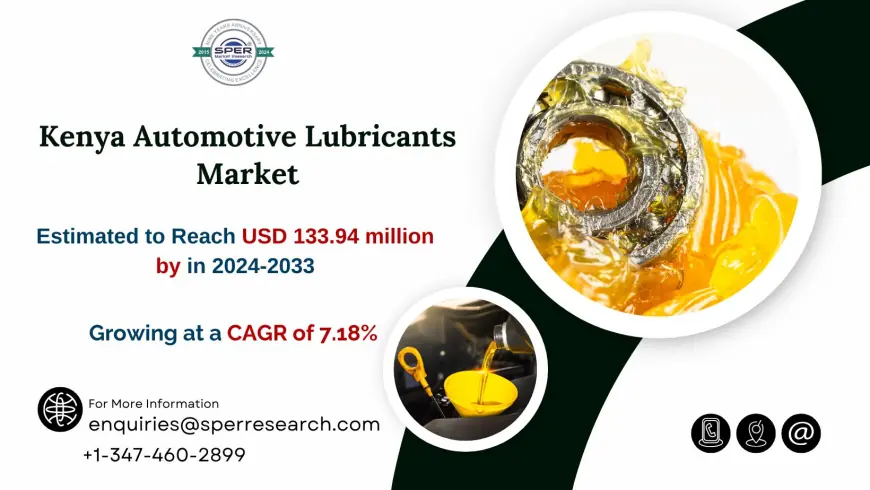Kenya Automotive Lubricants Market Expected to Reach USD 133.94 Million by 2033 with a CAGR of 5.26%
Kenya Automotive Lubricants Market Size, Revenue, Growth Drivers, Share, CAGR Status, Business Challenges and Future Opportunities 2033

Automotive lubricants are specialized fluids or greases that minimize friction, wear, and heat between moving parts in automobiles, resulting in efficient and smooth operation. These lubricants play an important function in protecting the engine and other components from damage caused by constant motion, high temperatures, and pollutants. Engine oils, transmission fluids, gear oils, braking fluids, and greases are all common forms of automobile lubricants, each with their own set of applications and performance specifications. Engine oils, the most often used automobile lubricant, protect engine components by generating a thin coating that reduces metal-to-metal contact and hence tear. Transmission and gear oils lubricate and cool gearboxes and transmissions, ensuring their smooth operation. Brake fluids are required for hydraulic braking systems to transfer force.
According to SPER Market Research, ‘Kenya Automotive Lubricants Market Size- By Product Type, By Vehicle Type, By Composition, By Sales Channel- Regional Outlook, Competitive Strategies and Segment Forecast to 2033’states that the Kenya Automotive Lubricants Market is estimated to reach USD 133.94 million by 2033 with a CAGR of 5.26%.
The Kenya automotive lubricants market is expanding primarily because of the rapid growth of the automotive industry, increased vehicle ownership, and rising demand for high-performance lubricants. Kenya's economic progress and urbanization have resulted in a huge increase in the number of vehicles on the road, including passenger cars, trucks, and motorcycles. This tendency directly drives up demand for engine oils, transmission fluids, and other vehicle lubricants. The industry is also being boosted by a growing awareness among vehicle owners about the significance of regular maintenance and the use of excellent lubricants to maintain engine efficiency and lifetime. Furthermore, advances in vehicle technology have boosted the demand for specialist lubricants designed for current engines, resulting in improved performance and fuel efficiency.
Request For Free Sample Report @ https://www.sperresearch.com/report-store/kenya-automotive-lubricants-market.aspx?sample=1
The Kenya automotive lubricants market confronts a number of issues, including the proliferation of counterfeit goods, fluctuating raw material prices, and a lack of consumer knowledge of premium lubricants. Counterfeit and substandard lubricants enter the market as a result of lax enforcement of quality standards, endangering car engines and consumer confidence. This problem is exacerbated by the high prices associated with genuine and high-quality goods, which dissuade some car owners from investing in dependable lubricants. Raw material price fluctuations, such as those in crude oil, have a considerable impact on production costs and market prices. These changes lead to instability, making it difficult for producers and distributors to maintain constant pricing, particularly in a price-sensitive market like Kenya.
The COVID-19 epidemic had a significant influence on Kenya's automotive lubricants business, owing to diminished economic activity and limited mobility during lockdowns. The dramatic drop in vehicle utilization, notably among passenger cars and commercial vehicles, resulted in decreasing demand for automotive lubricants. Routine vehicle maintenance and lubricant use decreased dramatically during the pandemic's peak, as industries and transportation services operated at reduced capacity. Disruptions to global supply chains compounded market challenges. Import restrictions and delays limited the availability of raw ingredients and produced lubricants, resulting in supply shortages and higher costs for manufacturers and distributors. Local blending factories also had operating challenges due to labor shortages and logistical constraints. However, as the constraints were relaxed, the market started to recover.
Nairobi dominates Kenya's automotive lubricants market due to its high concentration of vehicles, robust infrastructure, and role as the country's commercial hub. Some of the key players are- Galana Energies Limited, Hass Petroleum, Kenol & Kobil, National Oil Corporation of Kenya, Energizing Kenya
Our in-depth analysis of the Kenya Automotive Lubricants Market includes the following segments:
| By Product Type: |
|
| By vehicle Type: |
|
| By Composition: |
|
| By Sales Channel: |
|
For More Information, refer to below link:-
Kenya Automotive Lubricants Market Scope
Related Reports:
Follow Us –
LinkedIn | Instagram | Facebook | Twitter
Contact Us:
Sara Lopes, Business Consultant – U.S.A.
SPER Market Research
+1-347-460-2899












